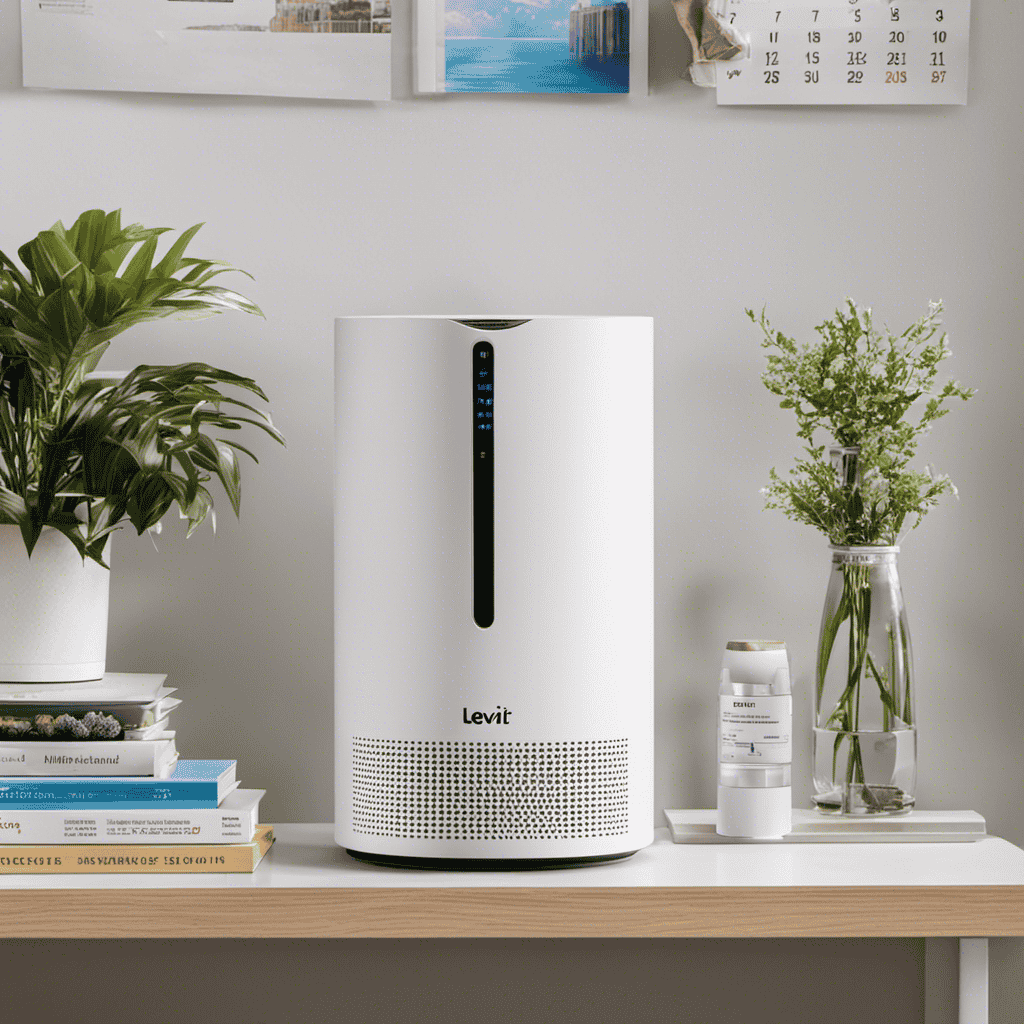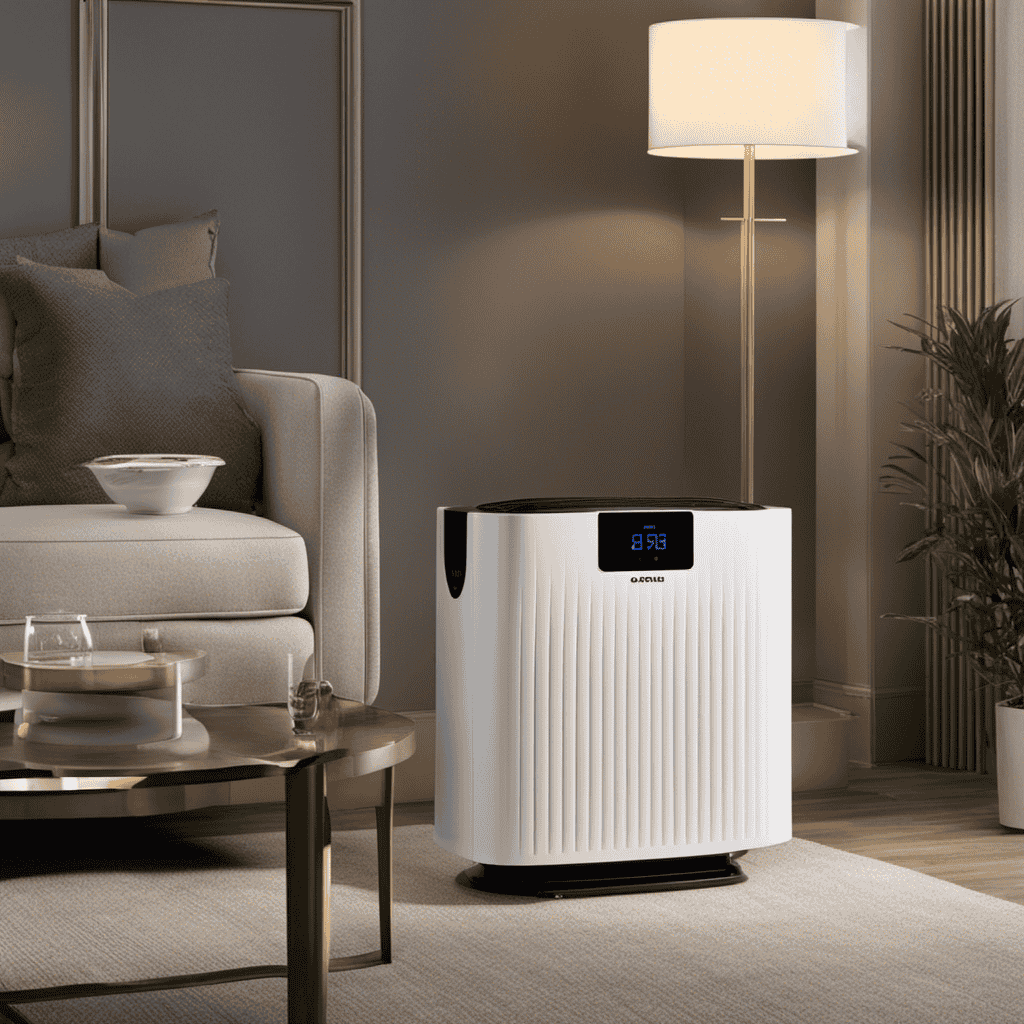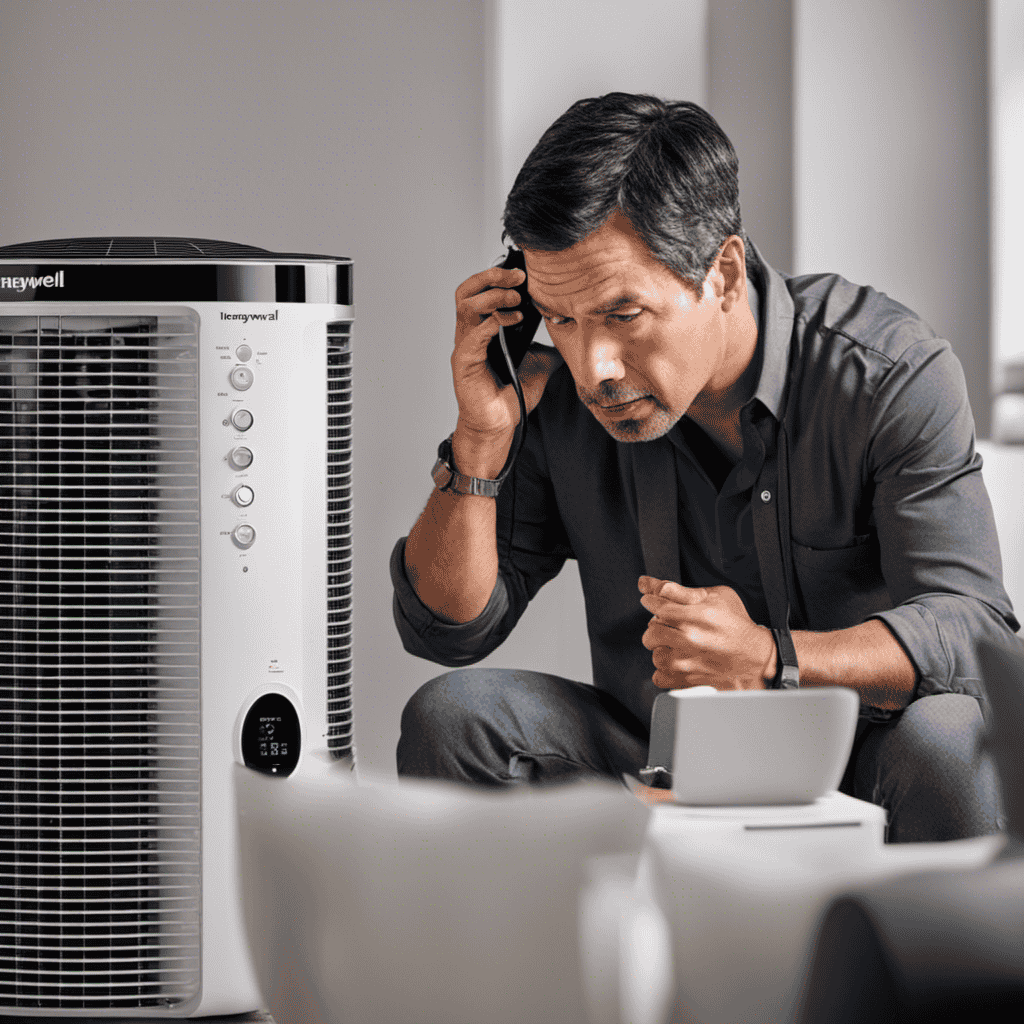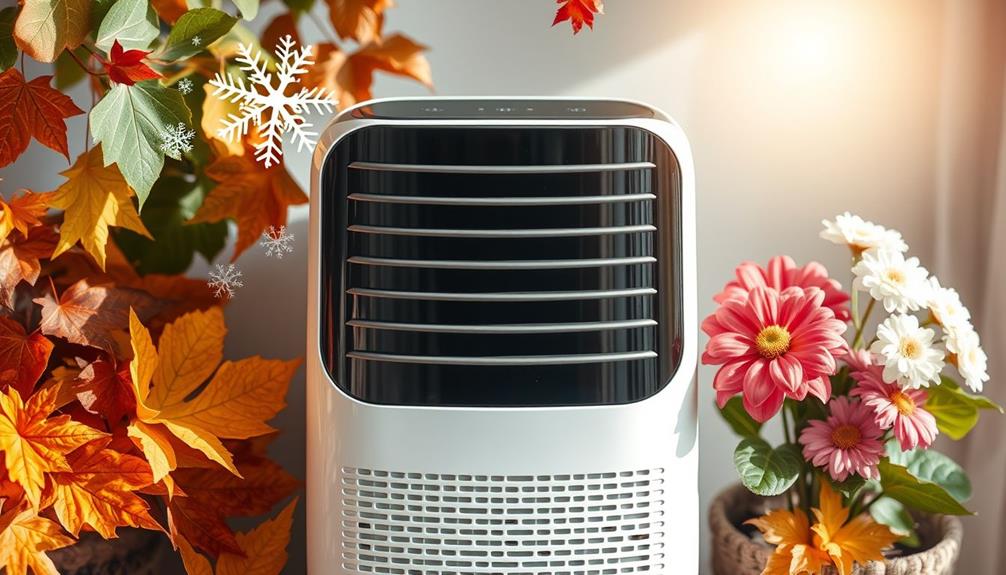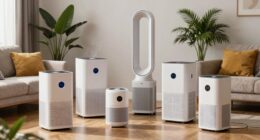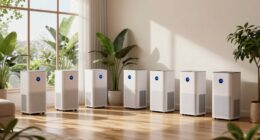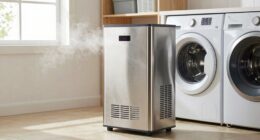You have purchased a Levoit air purifier, and now you may be asking yourself, ‘How frequently should I use it?’
Well, let me tell you, running your Levoit air purifier regularly is key to enjoying all its amazing benefits. In this article, I’ll guide you through the factors to consider when determining the ideal running frequency, recommended run times for different room sizes, and how to assess air quality.
Plus, I’ll share some valuable tips to maximize efficiency and avoid common mistakes.
Get ready to breathe cleaner, fresher air!
Key Takeaways
- Running your Levoit Air Purifier regularly is beneficial for optimal functioning and improved air quality.
- The air purifier traps and filters pollutants, resulting in clean and fresh air.
- Factors to consider when determining how often to run the air purifier include effectiveness, noise level, allergies, and air quality changes.
- Recommended run times vary based on room size, ensuring effective air purification while considering energy consumption.
Benefits of Running Your Levoit Air Purifier Regularly
You’ll experience a variety of benefits by running your Levoit air purifier regularly. Maintaining a consistent running frequency ensures that your air purifier functions optimally and efficiently.
By running it regularly, you can effectively remove pollutants and allergens from your indoor air, resulting in improved air quality. The air purifier works by trapping and filtering particles like dust, pet dander, pollen, and smoke, making it easier for you to breathe clean and fresh air.
Regular use also helps prevent the build-up of dust and other contaminants in your home, reducing the need for frequent cleaning. Additionally, running your Levoit air purifier regularly allows you to continuously monitor and assess the air quality in your space, ensuring a healthy and comfortable environment for you and your family.
Factors to Consider When Determining How Often to Run Your Levoit Air Purifier
To determine the frequency of use for your Levoit air purifier, take into account various factors.
First and foremost, you need to assess the effectiveness of your air purifier in improving your indoor air quality. If you suffer from allergies or sensitivities, you may need to run the purifier more frequently to ensure optimal air filtration.
Additionally, consider the noise level of your air purifier. Some models produce minimal noise, while others may be louder and disruptive. If noise is a concern, you may want to adjust the usage accordingly, perhaps running it during the day when you’re out of the house or at night when you’re asleep.
Recommended Run Times for Different Room Sizes
For optimal air filtration in different room sizes, adjust the run times of your Levoit air purifier according to the recommended guidelines.
The recommended run times for different room sizes are as follows:
-
For small rooms up to 161 square feet, it is recommended to run the air purifier for 6-8 hours a day.
-
For medium-sized rooms up to 322 square feet, it is recommended to run the air purifier for 8-10 hours a day.
-
For large rooms up to 538 square feet, it is recommended to run the air purifier for 10-12 hours a day.
These recommendations ensure effective air purification while also considering energy consumption. By adjusting the run times based on room size, you can optimize the performance of your Levoit air purifier.
Now, let’s move on to how to assess air quality to determine the running frequency.
How to Assess Air Quality to Determine Running Frequency
To assess the air quality in your home and determine the frequency of running the purifier, there are a few methods you can try. Evaluating the effectiveness of your air purifier is crucial in maintaining a healthy indoor environment.
One way to do this is by monitoring air pollution levels regularly. You can use an air quality monitor to measure the levels of pollutants such as dust, pollen, and smoke. This will help you understand the air quality in your home and decide how often you need to run the purifier.
Additionally, pay attention to any changes in air quality, such as increased allergies or respiratory issues, which may indicate the need for more frequent use. By evaluating the effectiveness and monitoring air pollution levels, you can ensure that your purifier is running at the optimal frequency to keep your home’s air clean and fresh.
Understanding the Maintenance Requirements for Your Levoit Air Purifier
When it comes to optimal purifier usage, cleaning, and filter replacement for your Levoit Air Purifier, there are a few key points to keep in mind.
First, it is important to run the purifier for the recommended amount of time based on the size of your room and the air quality.
Regularly cleaning the purifier, including wiping down the exterior and cleaning the filters, is crucial to maintain its effectiveness.
Lastly, it is essential to replace the filters as recommended by the manufacturer to ensure that the purifier continues to provide clean and fresh air.
Optimal Purifier Usage
The optimal usage of your Levoit air purifier depends on factors such as room size and air quality. To ensure optimal purifier performance, it is recommended to run the purifier continuously in a room with poor air quality or during times of high pollution.
In smaller rooms or areas with better air quality, running the purifier for a few hours a day should suffice. It’s important to note that running the purifier on higher fan speeds will clean the air more quickly, but it will also consume more energy.
If energy consumption is a concern, running the purifier on lower fan speeds or using the timer function can help reduce energy usage. Overall, finding the right balance between purifier usage and energy consumption is key to achieving clean and fresh air in your space.
Cleaning and Filter Replacement
Maintaining clean and fresh air in my space requires regularly cleaning and replacing the filters in my Levoit air purifier. The cleaning frequency and filter lifespan are essential factors to consider for optimal performance.
In general, it’s recommended to clean the pre-filter every two weeks to remove larger particles like dust and pet hair. The True HEPA filter and activated carbon filter should be replaced every six to eight months, depending on usage and environmental conditions.
However, it’s important to note that this timeframe may vary based on factors such as air quality and the presence of pollutants. Regularly checking the filters and following the manufacturer’s recommendations will ensure that my Levoit air purifier continues to effectively remove airborne contaminants and maintain clean air in my space.
Tips for Maximizing the Efficiency of Your Levoit Air Purifier
To get the most out of your Levoit air purifier, you should regularly clean the filters. This is essential for maximizing performance and ensuring that your air purifier is running efficiently.
In addition to regular filter cleaning, there are a few troubleshooting tips that can help improve the efficiency of your Levoit air purifier.
Here are some tips to help you maximize the efficiency of your Levoit air purifier:
-
Place the air purifier in a central location: Positioning the air purifier in a central location in your home will allow it to effectively circulate clean air throughout the space.
-
Keep doors and windows closed: To prevent outdoor pollutants from entering your home, make sure to keep doors and windows closed while the air purifier is running.
-
Use the appropriate fan speed setting: Levoit air purifiers typically have multiple fan speed settings. Adjust the fan speed based on your needs and the air quality in your home.
-
Regularly monitor and replace filters: Be sure to monitor the filter indicator and replace the filters as recommended by the manufacturer. Clean filters are essential for maintaining the efficiency of your air purifier.
Adjusting Running Frequency Based on Seasonal Air Quality Changes
Now that we’ve discussed some tips for maximizing the efficiency of your Levoit air purifier, let’s talk about adjusting the running frequency based on seasonal air quality changes.
As the seasons change, so does the air quality in your home. During certain times of the year, such as allergy season or when there are high levels of pollutants in the air, you may need to run your air purifier more frequently.
To effectively adjust the running frequency, it’s important to pay attention to the air quality in your area and adjust the filter settings accordingly. Some air purifiers have customizable settings that allow you to adjust the fan speed and intensity based on the level of pollutants in the air. By adjusting these settings, you can ensure that your air purifier is running efficiently and effectively.
It’s also important to consider the impact of your air purifier on energy consumption. Running your air purifier for extended periods of time can increase your energy usage. To minimize energy consumption, you can set a timer on your air purifier or use it in shorter intervals throughout the day. This way, you can still enjoy clean air while being mindful of your energy usage.
Common Mistakes to Avoid When Running Your Levoit Air Purifier
One common mistake to avoid when using your Levoit air purifier is neglecting to clean the filters regularly, as this can hinder its performance. Cleaning the filters is essential for maintaining the efficiency and effectiveness of your air purifier. Another mistake to avoid is placing the air purifier in a location with poor airflow or obstructing its vents, as this can restrict its ability to clean the air properly. Additionally, make sure to avoid running the air purifier continuously without giving it a break, as this can put unnecessary strain on the device and potentially shorten its lifespan. Lastly, be cautious when setting up your Levoit air purifier to ensure that it is not exposed to excessive moisture or humidity, as this can damage the internal components. By avoiding these common mistakes, you can optimize the performance and longevity of your Levoit air purifier.
| Mistakes to Avoid | Troubleshooting Common Issues |
|---|---|
| Neglecting to clean the filters regularly | Lack of airflow or obstructed vents |
| Running the air purifier continuously without breaks | Exposing the purifier to excessive moisture or humidity |
Is There a Recommended Schedule for Running the Levoit Air Purifier for Optimal Air Quality?
Yes, there is a recommended schedule to run Levoit air purifier for optimal air quality. It is recommended to run Levoit air purifier 24/7 for the best results. This ensures continuous purification of the air and keeps the air quality at its best throughout the day.
Frequently Asked Questions
Can I Run My Levoit Air Purifier 24/7?
I can run my Levoit air purifier 24/7, but it’s not necessary. Running it overnight can benefit me by improving air quality while I sleep. However, it’s important to follow manufacturer guidelines for optimal performance and filter replacement.
Does Running My Levoit Air Purifier Increase My Electricity Bill Significantly?
Running my Levoit air purifier regularly not only improves indoor air quality but also helps save energy. I can follow energy-saving tips like using the lowest fan speed and running it for a few hours daily.
Is It Safe to Run My Levoit Air Purifier While I Am Sleeping?
It is safe to run my Levoit air purifier while I am sleeping. Regular use of an air purifier can improve indoor air quality and provide numerous benefits. Remember to follow the recommended maintenance guidelines for optimal performance.
Can I Use My Levoit Air Purifier in a Room With Pets?
In a room with pets, it’s recommended to run my Levoit Air Purifier for at least 4 hours a day. With a room size of 215 sq. ft., the recommended filter maintenance is every 6-8 months.
Are There Any Health Risks Associated With Running a Levoit Air Purifier for Long Periods of Time?
Running my Levoit Air Purifier for long periods of time does not pose any health risks. In fact, it offers numerous health benefits. The recommended usage is to run it continuously or as needed, depending on your indoor air quality.
Conclusion
In conclusion, running your Levoit Air Purifier regularly is like having a faithful guardian protecting your health.
Just as a watchful shepherd keeps the flock safe from harm, your air purifier diligently filters out pollutants, allergens, and odors, ensuring clean and fresh air for you to breathe.
By considering factors such as room size, air quality, and maintenance requirements, you can determine the optimal running frequency.
Remember, a well-maintained and efficiently running Levoit Air Purifier is the key to a healthier and more comfortable living environment.
Trust in its power, and let it purify your air with unwavering dedication.
